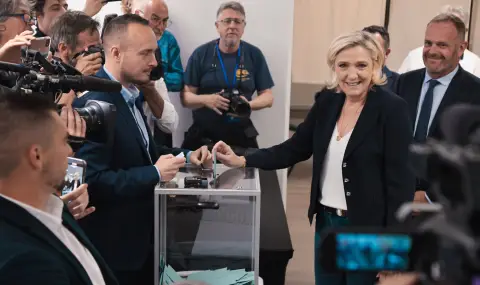The opponents of the "National Assembly" stepped up efforts to prevent a far-right party from seizing power in France. A growing number of candidates have said they will withdraw from the second round of the French parliamentary elections this weekend to avoid wasting the votes of voters opposed to Marine Le Pen, Reuters reported.
According to local media, around 180 candidates have confirmed that they will not take part in the second round of elections on Sunday for the composition of the 577-member National Assembly (the lower house of the French parliament). The remaining applicants have until 18:00 local time to make their choice.
Marine Le Pen's party took a big lead in the first round of voting after President Emmanuel Macron's risky move to call early parliamentary elections failed and put his centrist alliance in an unenviable third place, behind a newly formed left-wing coalition "New People's Front".
But even before the political maneuvering of the last 24 hours to create a "republican front" to block the anti-immigrant and Eurosceptic party, it was far from clear whether the "National Assembly" will be able to win the necessary 289 seats in the National Assembly for a majority.
According to sociological surveys, the results of the first round show that the "National Assembly" is on track to get between 250 and 300 seats. However, this was before the tactical retreats and cross-party appeals to voters to support in the second round the candidate who is able to oppose and defeat his local opponent from Le Pen's party.
"The game is not over. We must mobilize all our forces," he told France 2 television. the mayor of Paris Anne Hidalgo, who is a member of the Socialist Party - part of the newly formed left coalition.
Financial markets rallied yesterday on general relief that the far right had not fared better, although the reaction was muted by the fact that a "hanging" A parliament without a clear majority would risk policy paralysis for the rest of Macron's presidency until 2027, Reuters notes.
There was initial confusion over whether Macron's allies would drop out of the vote in favor of better-performing rival candidates if they were members of the far-left "Unyielding France" party. of Jean-Luc Mélenchon, which is also part of the newly formed left coalition.
However, yesterday Macron said at a closed meeting of the Council of Ministers at the Elysée Palace that the main priority was to prevent a "National Assembly" to power and that the candidates of "Unyielding France" can be supported if necessary.
"The Republican Front" has worked before - such as in 2002, when voters from all walks of life overwhelmingly backed Jacques Chirac in the presidential race to defeat Marine Le Pen's father Jean-Marie.
However, it is not certain that voters these days are inclined to follow the directions of political leaders on who to vote for, amid Le Pen's efforts to improve her party's image, which has contributed to its portrayal as more -acceptable to millions of voters.
Today Le Pen confirmed her claim that the "National Assembly" will not attempt to form a government if she and her allies do not have a working majority in parliament. "We cannot agree to form a government if we cannot act. This would be the worst betrayal of our voters," she told France Enter radio.
In a foretaste of the bad mood that will prevail in the case of "cohabitation" of power-sharing between Macron and a government led by an "Assembly National", Le Pen referred to media speculation that he plans to make key public sector appointments to prevent her party from implementing his policies.
While not claiming to have evidence of this, Le Pen said any such move would amount to an "administrative coup".
